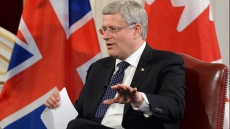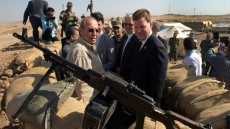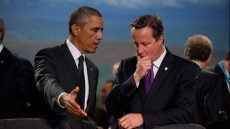Canada is to host its final meeting as head of the circumpolar world next spring after a term in which some say this country's greatest achievement has been simply holding the Arctic Council together.
"It hasn't imploded," said Rob Huebert of the University of Calgary's Centre for Strategic Studies. "Ukraine has sucked all the nature of true co-operation and friendship at the highest levels out of the room."
Canada took over as chair of the Arctic Council — the eight nations that ring the North Pole — in May 2013. On Friday, the government announced it would hand the leadership off to the United States next April in Iqaluit.
Canada's intent for its term was to encourage development that benefited northerners. But almost from the start, diplomats found themselves in rough waters as one of the council's main players — Russia — began imposing its will on neighbouring Ukraine, annexing the Crimea and supporting Russian separatists in the westward-looking country.
Prime Minister Stephen Harper said last spring that Russia's actions were "aggressive, militaristic and imperialistic" and a grave threat to world peace.
"When we're sitting there saying that (Russian President Vladimir) Putin represents a return to the bad old days of the Soviet Union, how does that not influence the direction the Russian officials are getting?" asked Huebert.
Canada did boycott one low-level council meeting in Russia. But it hosted Russian officials several times for meetings in Canada.
"(The government) did not burn bridges with Russia in the Arctic," said Michael Byers, professor of international law at the University of British Columbia. "Someone in the Prime Minister's Office or the foreign minister's office understood the necessity of keeping those channels of communication open."
Huebert agreed.
"The fact they kept the meetings going, I give them credit for that."
Canada also achieved its main goal of creating the Arctic Economic Council, a group of businesses operating in the North that is intended to share best practices and encourage economic development.
"This was something that everybody on the Arctic Council wanted," said Anthony Speca, a U.K.-based consultant and former high-level Nunavut bureaucrat — although he points out the council is currently dominated by large companies such as Russian energy giant Rosneft.
"The people there aren't necessarily northerners."
People in the North aren't always sympathetic to industry, said Speca, who gave as an example heavy Inuit opposition to seismic testing in the Davis Strait.
Byers said the council's creation is small beer compared to other issues that haunt the Arctic. Canada showed little leadership on such issues as climate change, he suggested.
"Given the scale of the challenges, we accomplished very little — but we didn't set out to," Byers said. "The Harper government set out to act as a placeholder for two years."
The Americans are already drafting an ambitious agenda for their term, Byers said. The former commander of the U.S. Coast Guard, a four-star admiral, is to be their top Arctic official.
"Clearly, under (President Barack) Obama they are trying to highlight the importance of the Arctic Council," Huebert said.





